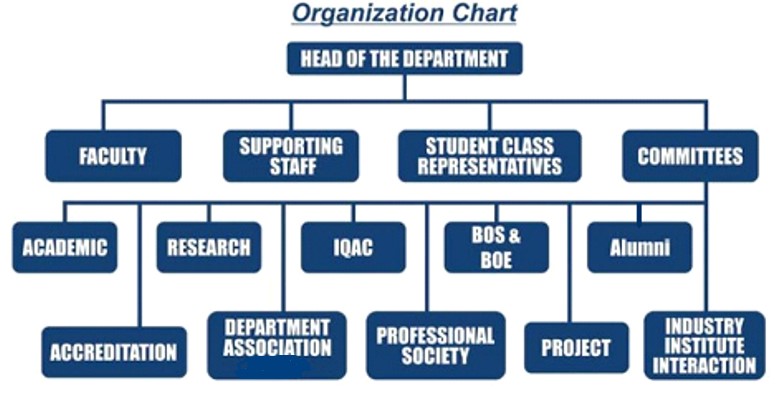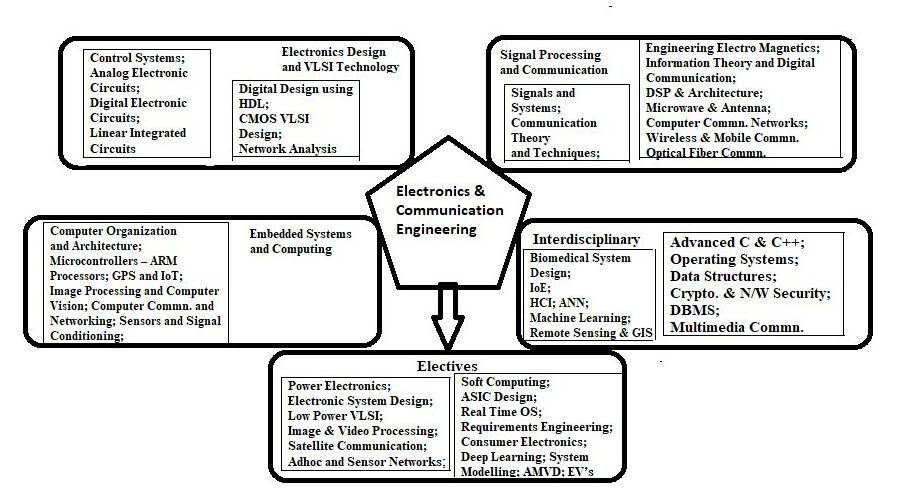Vision
The Electronics and Communication Engineering department shall impart quality technical education and entrepreneurship skills to develop creative individuals to face changing global scenario.
Mission
To augment the national talent pool, with Electronics and Communication Engineers having all-encompassing technical knowledge, principled practices and nationalistic outlook.
Time table
Calendar of Events
Welcome to Electronics & Communication Engineering
Program Educational Objectives (PEOs) (U.G)
1. The graduates will acquire core competence in basic science and Electronics and Communication Engineering fundamentals necessary to formulate, analyze, and solve engineering problems and to pursue advanced study or research
2. The graduates will engage in the activities that demonstrate desire for ongoing personal and professional growth and self confidence to adapt to rapid and major changes
3. The graduates will maintain high professionalism and ethical standards, effective oral and written communication skills, work as part of teams on multidisciplinary projects under diverse professional environments, and relate engineering issues to the society, global economy and to emerging technologies.
Program Educational Objectives (PEOs) (PG Digital Communication and Networking)
1. The post graduates will engage in technical and research activities toward their personal and professional growth in the fields associated to Digital Communication and Networking
2. The post graduates will acquire core competence in the field of Digital Communication and Networking necessary to investigate multidisciplinary problems and build concrete solutions leading to innovative outcome catering to societal needs.
3. The post graduates will demonstrate outstanding techno managerial skills, thorough professionalism and high ethical standards to develop pool of skilled professionals who would effectively contribute towards development of global engineering solutions
U.G-Programme Outcomes [POs]
1. Engineering Knowledge: Apply the knowledge of mathematics, science, engineering fundamentals and an engineering specialization to the solution of complex engineering problems.
2. Problem Analysis: Identify, formulate, review research literature, and analyze complex engineering problems reaching substantiated conclusions using first principles of mathematics, natural sciences and Engineering sciences.
3. Design/Development of solutions: Design solutions for complex engineering problems and design system components or processes that meet the specified needs with appropriate consideration for the public health and safety, and the cultural, societal, and environmental considerations.
4. Conduct investigations of complex problems: Use research-based knowledge and research methods including design of experiments, analysis and interpretation of data, and synthesis of the information to provide valid conclusions.
5. Modern tool usage: Create, select, and apply appropriate techniques, resources, and modern engineering and IT tools including prediction and modeling to complex engineering activities with an understanding of the limitations.
6. The engineer and society: Apply reasoning informed by the contextual knowledge to assess societal, health, safety, legal and cultural issues and the consequent responsibilities relevant to the professional engineering practice.
7. Environment and sustainability: Understand the impact of the professional engineering solutions in societal and environmental contexts, and demonstrate the knowledge of, and need for sustainable development.
8. Ethics: Apply ethical principles and commit to professional ethics and responsibilities and norms of the engineering practice.
9. Individual and team work: Function effectively as an individual and as a member or leader in diverse teams, and in multidisciplinary settings.
10. Communication: Communicate effectively on complex engineering activities with the engineering community and with society at large, such as, being able to comprehend and write effective reports and design documentation, make effective presentations, and give and receive clear instructions.
11. Project management and finance: Demonstrate knowledge and understanding of the engineering management principles and apply these to one’s own work, as a member and leader in a team, to manage projects and in multidisciplinary environments.
12. Life-long learning: Recognize the need for and have the preparation and ability to engage in independent and lifelong learning in the broadest context of technological change.
P.G-Programme Outcomes [POs]
1. An ability to independently carry out research /investigation and development work to solve practical problems
2. An ability to write and present a substantial technical report/document
3. Students should be able to demonstrate a degree of mastery over the area as per the specialization of the program.
Program Specific Outcomes (PSOs)
1. Understanding and applying the mathematical and scientific concepts, for analysis and design of basic Electronics and Communication systems.
2. Develop critical thinking and creative abilities coupled with competence in use of computational tools for professional growth complimented with communication skills and leadership attributes
3. Identify societal needs and sensitize individuals towards finding innovative solutions to contemporary issues through multidisciplinary outlook, spirit of entrepreneurship and research.
Program Specific Outcomes (PSOs) (PG Digital Communication and Networking)
1. Post graduates shall be able to analyze the concepts of Digital Communication and Networking to provide optimal solutions for real time problems using state of the art tools and techniques.
2. Post graduates shall engage in technical pursuits with professional and ethical standards, leading to research activities and innovative products
3. Post graduates shall exhibit domain related technical and managerial skills required for the development of the society.
- Interactive Lectures provide strategies and specific examples of techniques and activities designed to involve students in large and small lecture-based classes.
- PPT and Videos provide a platform for incorporating a variety of multi-media file-types: images, audio, and animations which make the teaching-learning more effective.
- E-learning – where the students can obtain information through websites such as http://nptel.iitm.ac.in and national and international journals. This enhances the subject knowledge and helps in knowing the development in technology.
- Effectiveness of these methods is reflected in the form of academic results, Placements, Admission to higher studies in India and abroad, Quality of projects done, Participation of the students in technical paper presentation.
- Indirect assessment of content delivery methods by gathering feedback from the students helps to determine the effectiveness of teaching methods.

